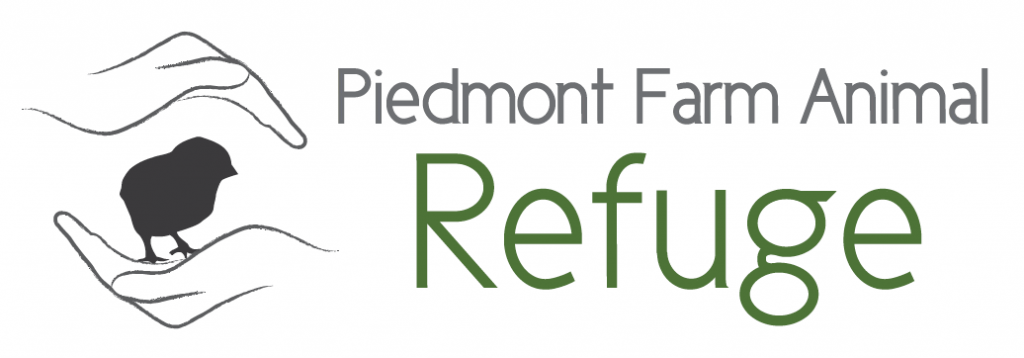Chicken Care 101: Adopting Backyard Chickens

Thinking about adding chickens to your family? In this five-part blog series, we’ll cover the basics to help you decide if bringing chickens into your life is the right choice for both you and the birds. You’ll learn about chicken adoption, safe housing, medical care, proper diet, and the importance of social and emotional care.
In this post, you’ll learn the basics of chicken adoption, including where to adopt and how to decide if it’s right for you and your family.
Content is provided by Piedmont Farm Animal Refuge, a non-profit rescue and sanctuary for farm animals located in Pittsboro, North Carolina. Open for tours, volunteering, and more. Learn about the Refuge at www.piedmontrefuge.org and find more information at the bottom of this post.
Part 1: Adopt, Don’t Shop!
The familiar phrase “adopt, don’t shop” is usually associated with dogs and cats. However, there are many reasons that adoption is the best option for chickens, as well! In fact, many of the same issues associated with purchasing a puppy apply to purchasing a baby chick.
Buying Chicks – When purchasing chicks in both online and in farm stores, be wary of sellers who “guarantee” chicks to be of a certain sex. Determining if a chick is male or female requires an expert and mistakes are routinely made. If the business promises to take back any birds they misidentified, those chicks are often disposed of by being killed.
Save a Life – By adopting chickens, you can save the life of a bird in need! Many chickens are at shelters, rescue organizations, and sanctuaries right now just waiting for the right person to give them a good home. When people choose to adopt, they create the space for other chickens to be rescued and in doing so, save lives.
Farm Stores – You probably know that most puppies available for purchase come from puppy mills. Similarly, most chicks available for purchase come from hatcheries. The sad truth behind the cute chickens you see at your local farm store is the immense suffering many go through at hatcheries. The details are grim and include rough handling, harsh living conditions, and the killing of thousands of babies. Male chicks, who are unwanted because they don’t lay eggs, are routinely killed by being ground up alive! If you want to go deeper, you can learn more about hatcheries here. The good news is that all of this can be avoided by simply following the “adopt, don’t shop” rule.
Know Who You are Getting – When adopting chickens you will likely be choosing from adult birds instead of babies – this is a good thing! First of all, you will not have to learn special skills to take care of delicate baby chicks, who can die easily without their mother’s and expert care. Secondly, you will be able to know details about who you are adopting including if they are male or female, their temperament, and their personality. This will help you in the long term – you will be able to choose birds that fit well with your family and particular living situation (especially if you live in an area with harsh zoning restrictions).
Online Purchasing – There are many websites that advertise chickens for sale. These shops should be avoided for several reasons. First of all, many of the birds are still coming from hatcheries, the details of which are discussed above. Secondly, the usual way of getting the birds to your home involves shipping them live through the mail. For these birds, many of them day old babies, the stress of transport is often too much for their delicate bodies and many do not make it. Companies routinely send “extras” since the mortality rate is so high. Delays in shipping, incorrect addresses, and other blunders cause entire boxes of birds to perish, as they are typically mailed without access to food or water.
Part 2: Deciding If Chickens Are Right For You
Before adopting chickens it’s important to consider a number of factors.
Property Zoning & Regulations – Your first step should be to find out the county and neighborhood rules that apply to your property. Many urban areas do not allow chickens, and many homeowners associations may have strict guidelines, as well. There could be regulations related to where the chickens live, the sex of the birds, or the number of birds allowed. Be sure that you are aware of the legalities before adopting. If you ignore the regulations and a neighbor complains, your birds could be seized by animal control.
Other Animals – Do you currently have other animals in your family, or do you plan to take in other animals in the future? While chickens can generally get along with a large number of species, dogs can sometimes be aggressive towards them and cause harm or death. If you do have other animals living with you, it is best to introduce chickens on a trial basis (perhaps through a meet and greet) to ensure that everyone will get along safely.
The Rule of Two – Chickens, like many other animals, will thrive when living with a companion of the same species that speaks the same language! Consider adopting at least two birds who can be besties and get the most out of life. Many adoptable chickens may already be living with close companions that they would prefer to stay with instead of being parted. If adopting both males and females, keep in mind that you may need more than one hen for each rooster you adopt. Determining the correct balance often depends on their individual personalities, so you should attempt to learn as much as possible about the birds before adopting.
You and Your Budget – Do you enjoy waking up early and trekking outside in the heat, rain, or snow to provide breakfast? Are you able to be home before dark to ensure your birds stay safe from predators? Are you ready to pay potentially large vet bills when your chickens get sick? If you answered yes to these questions, you are well on your way to deciding if chickens are right for you.
Part 3: Where To Adopt
Animal Shelters – One of the first places to look for chickens in need is at your local animal shelter. Unfortunately more and more chickens are being dumped at county shelters when people get them without considering all the factors. Birds at county shelters are at high risk for being euthanized if no one comes forward to adopt them. Adopt A Bird Network is a great resource to help you find needy chickens waiting at animal shelters around the country. You can also reach out directly to your local shelter via phone or website to look for birds in need.
Rescue Organizations & Animal Sanctuaries – Some rescue organizations, such as The Humane Society, may have chickens for adoption. There are also hundreds of animal sanctuaries around the county that have adoption programs or may be able to connect you with chickens in need. An added benefit of adopting from a sanctuary is that most will be more than happy to answer any questions you may have about chicken care and will have additional useful information about quality veterinarians and much more.
Stay tuned for upcoming articles that will go into detail about safe housing, medical care, diet and nutritional needs, and social and emotional care for chickens. Have a question about adopting chickens? Contact Piedmont Farm Animal Refuge at info@piedmontrefuge.org.
Content provided by:
Lenore Braford
Founder & Shelter Manager
Piedmont Farm Animal Refuge
www.piedmontrefuge.org
www.facebook.com/PiedmontFarmAnimalRefuge
www.instagram.com/piedmont_farm_animal_refuge


